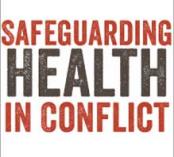
A new coalition of international nongovernmental organizations is calling on the global community to protect health workers, services, and infrastructure during armed conflict or civil disturbances.
The Safeguarding Health in Conflict coalition promotes respect for international humanitarian and human rights laws that relate to the safety and security of health facilities, workers, ambulances, and patients. This marks the first time an international coalition has come together to work on this issue.
Assaults on health facilities, health workers, and the patients they serve are all too common during armed conflict or civil disturbances. Aside from the devastating human toll they take, these attacks compromise the ability to deliver care to populations in great need, impede efforts to reconstruct health systems after war, and lead to the flight of health workers whose presence in a time of great social stress is essential.
The need for documentation
Due to scarce documentation, the international community has not been able to quantify the true scale of these assaults or their detriment to public health outcomes and infrastructure. Anecdotal evidence persists: in Somalia, a suicide bomber attacked a medical school graduation ceremony in the capital of Mogadishu, killing 22, including the ministers of health, education, and higher education and several new doctors—from only the second class of medical graduates in Somalia in nearly 20 years. In Afghanistan, with the world’s most imperiled health system, health workers are often subjected to threats, harassment, and attacks; many have been abducted to treat wounded fighters or for ransom.
“The principle of medical neutrality has been increasingly flouted,” said Maurice I. Middleberg, vice president for global policy at IntraHealth International. “Now political parties view targeting medical facilities or abusing medical symbols as a subterfuge for military activity.”
The list of countries where military and rebel forces have violated international conventions for medical neutrality goes on: Mali, Bahrain, Syria, Libya, Kosovo, Democratic Republic of the Congo, Central African Republic, Sri Lanka, Kenya, and many more. Because such attacks usually go unreported, it has been challenging to stimulate the political will to demand that perpetrators be held accountable.
Yet there has been recent progress toward increasing the evidence base. “We have a way forward in the resolution pending at the World Health Assembly that would require the World Health Organization to provide international leadership on the collection and dissemination of data on attacks on health workers,” said Leonard Rubenstein, a senior scholar at the Center for Public Health and Human Rights, Johns Hopkins Bloomberg School of Public Health.
Coalition objectives and members
The new coalition promotes respect for international humanitarian and human rights laws that relate to the safety and security of health facilities, workers, ambulances, and patients during periods of armed conflict or civil violence. The coalition focuses on:
- Strengthening international mechanisms opposing such attacks
- Increasing evidence of attacks
- Holding violators accountable
- Developing practical strategies for protection.
Members of the Safeguarding Health in Conflict coalition include IntraHealth International, Center for Public Health and Human Rights at the Johns Hopkins Bloomberg School of Public Health, Doctors for Human Rights, International Council of Nurses, International Health Protection Initiative, International Rehabilitation Council for Torture Victims, Karen Human Rights Group, Medact, Merlin - UK, and Physicians for Human Rights.
Non-voting observers include the International Committee of the Red Cross, American College of Physicians, and World Medical Association.

